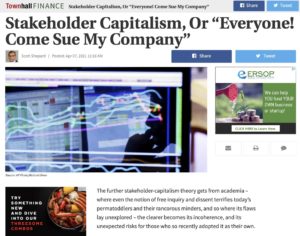
13 May 2021 Stakeholder Capitalism: A License for Lawsuits
As more and more CEOs embrace “stakeholder capitalism,” these newly minted citizens of the woke world are going to realize the harsh reality that they have put their companies and themselves in tremendous legal peril.
 In a Townhall commentary, Scott Shepard – the deputy director of the National Center’s Free Enterprise Project – concludes that “stakeholder capitalism is an open invitation by eager but inattentive CEOs for just about everyone… to sue their companies for absolutely everything.”
In a Townhall commentary, Scott Shepard – the deputy director of the National Center’s Free Enterprise Project – concludes that “stakeholder capitalism is an open invitation by eager but inattentive CEOs for just about everyone… to sue their companies for absolutely everything.”
And the business-judgement rule that corporate lawyers normally use to get themselves out of lawsuits isn’t going to work if companies aren’t actually operating in the best interests of themselves and their investors.
It wouldn’t be that hard to sue, and Scott lays out a template for corporate disaster:
A shareholder, standing in the shoes of Company, sues, arguing that the CEO and other managers of Company have violated their fiduciary duty to Company, and therefore to the shareholder. The shareholder submits evidence of Company’s losses and Company statements about the shift to stakeholder primacy and about making this decision specifically for stakeholders.
It can be an open-and-shut case:
[T]he court’s analysis will open the door to inquiry about whether this decision, if it cannot objectively be shown to have been in the best interest of Company, was instead made for some self-serving reasons of the CEO and management, including to advance their personal policy preferences at Company expense…
Once these shareholder lawsuits start, the best outcome Company can hope for under the business-judgment rule is that it makes a public admission to a court that its stakeholder-capitalism performativeness was all a lie, spending rather a lot of Company money to prove to a court that a decision that it had told the world was for stakeholder benefit was really for the shareholders. At worst, Company executives will be held personally liable for self-dealing, and inevitably pushed from their positions.
And saying an action was taken almost solely to benefit stakeholders is tantamount to an admission of guilt in terms of a company abdicating its fiduciary responsibility to shareholders.
Game over.
Scott presented a third way – and the preferred way of leftists trying to drive America’s c-suites – that is not the way CEOs want to go:
Executives have one legal way to avoid this suicide by litigation… They can legally transform their companies from business corporations to public-benefit corporations (essentially charitable corporations). The option is available in Delaware, where most corporations are headquartered, and many other states. The ESG agitators are pushing them to make this change. The logic of their performative embrace of stakeholder capitalism would – if their performances were honestly intended – impel them to make the move.
But corporate executives resist. They resist because this move would require them to set out a hierarchy of charitable concerns and would empower state attorneys general to enforce their adherence to those charitable obligations. This would constrain their omnipotence – their true purpose for rhetorically embracing stakeholder capitalism. And it would send investors fleeing, as it became clear that their capital had been turned overnight into charitable contributions.
Before woke stakeholder capitalism practices make Wall Street go broke, Scott advises CEOs to “stop preening and start thinking.”
Read all of Scott’s commentary – “Stakeholder Capitalism, Or ‘Everyone! Come Sue My Company” – by clicking here.




